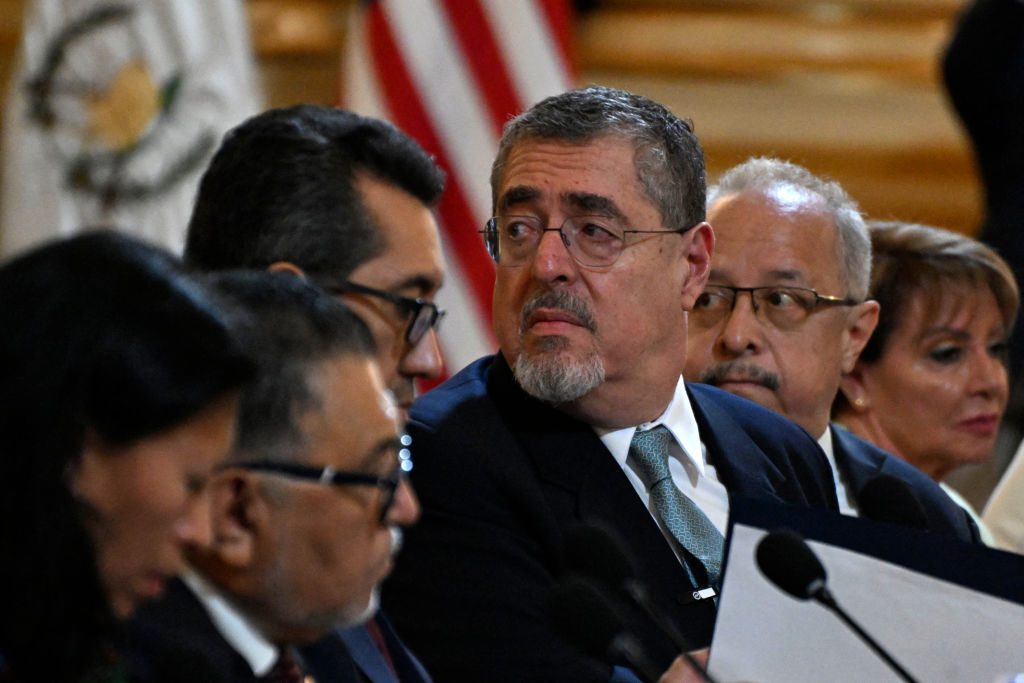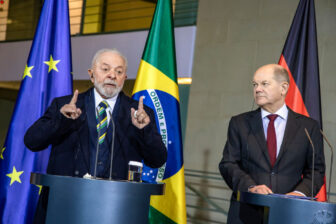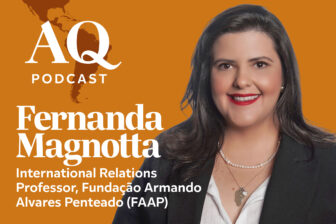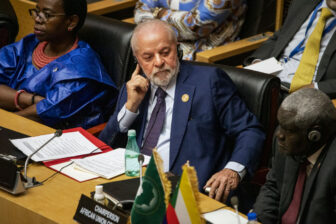GUATEMALA CITY—As democracy fades in some parts of Latin America and the Caribbean, Guatemala’s President Bernardo Arévalo can become the newest ally of the U.S. and EU in the struggle against democratic backsliding. Largely thanks to pressure from the international community, he overcame concerted efforts to disrupt the transfer of power and prevent his inauguration in January. After these tense moments, the country became a success story for how to defend democracy.
As Guatemala’s new leader prepares his first official trip to the U.S. on March 25—and his second international tour since his inauguration—Arévalo may do well to signal what kinds of international diplomacy his administration will wield as it tries to rebuild the global image of a nation fighting poverty and violence. While his government represents new opportunities for the country, with nearshoring partnerships looking closer now than in previous administrations, Arévalo’s challenges are more political than economic if he wants to stay in the good graces of Guatemala’s most important business partner.
Guatemala’s ties with the international community may be critical to its success or failure. In recent years, there have been tensions in the relationship with the U.S., particularly over issues such as corruption, human rights abuses, and migration. The U.S. has imposed sanctions on Guatemalan officials accused of corruption and has threatened to withhold aid in response to concerns about governance. In his meetings in Washington, Arévalo will probably need to present a case for his immigration and drug interdiction policies, two sensitive topics as the U.S. presidential election approaches.
But China will most likely be the predominant topic in these conversations. So far, Arévalo has reaffirmed ties with Taiwan while potentially exploring expanded trade with Beijing. How his administration will handle relationships with both the U.S. and China is an open question.
Arévalo’s U.S. agenda
“The relationship between the United States and Guatemala is going through a very special moment,” Arévalo said at the bilateral high-level economic dialogue held in Guatemala on March 18. During his visit to Washington, Arévalo is expected to discuss a foreign investment plan to tackle the root causes of migration and use remittances for local development. Unlike his predecessors and neighbors in Central America, Arévalo is betting on economic investment—above security policies—to mitigate mass migration from Guatemala to the U.S. According to a 2023 USAID study, 77% of Guatemalans who intend to migrate do so in search of economic opportunities.
On border security and drug trafficking, Arévalo will most likely commit to complying with the agreements reached in the trilateral ministerial meeting on migration held last month with Mexico: sharing data about migration flows; improving security, law enforcement, processes and infrastructure along their international borders; and investigating and prosecuting human trafficking and migrant smuggling networks.
The president’s preliminary agenda includes—in addition to the White House visit—meetings with Secretary General of the Organization of American States Luis Almagro and high-level USAID officials, as well as conversations with representatives of the Democratic and Republican parties.
Diplomacy is alive
Arévalo, a former diplomat, is continuing a to engage internationally following a trip to Europe in February. After that visit, the International Olympic Committee provisionally lifted Guatemala’s suspension. The European Union has committed to invest more than 50 million euros for the protection and conservation of the Mayan region in Petén.
His trip also marked the first time a Guatemalan president participated in Munich Security Conference. During the event, Arévalo held high-level meetings with the presidents of Ukraine and Israel, making it clear he has a pro-Western foreign policy. “This sets him apart from the left-wing presidents in Latin America,” said constitutional lawyer Edgar Ortiz on the Tangente podcast.
For some, the country’s image is being rebuilt. “Diplomatic relations were severely damaged due to the accelerated authoritarian actions of former governments. Almost a decade of mistakes must be undone,” commented Christián González, an international law expert. Gone are the days when the president of Guatemala threatened to name ambassadors from European countries as personae non gratae, as the governments of Jimmy Morales and Alejandro Giammattei isolated the nation from the world stage under the excuse of “national sovereignty.”
Guatemala’s neighbors
While the picture is more straightforward in Guatemala’s new relationship with the U.S., Arévalo’s policies toward neighboring countries engaged in political and economic alignment with China remain to be seen. Salvadoran President Nayib Bukele signed “a gigantic non-refundable and unconditional cooperation” deal with Xi Jinping’s administration, and almost a year ago, Honduras’ President Xiomara Castro cut ties with Taiwan to open a new embassy in Beijing.
Costa Rica is a unique case. It is too far for the U.S.’ immigration interests and too close to China to become an essential ally; however, their biggest problem is internal. Costa Rica has gone through a historic rise in crime , which may make Bukele’s security model more appealing. And in Nicaragua, Daniel Ortega continues to crack down on dissidents—Last month an independent group of UN experts denounced the Nicaraguan government’s “serious systematic human rights violations, tantamount to crimes against humanity.”
Can Bernardo Arévalo be the antidote to democratic backsliding in Central America? If he wants a chance, now would be a good time for him to pursue an active foreign policy not only with the U.S. and Europe, but closer to home.
__
Chang is a political consultant and professor at the Universidad del Valle







